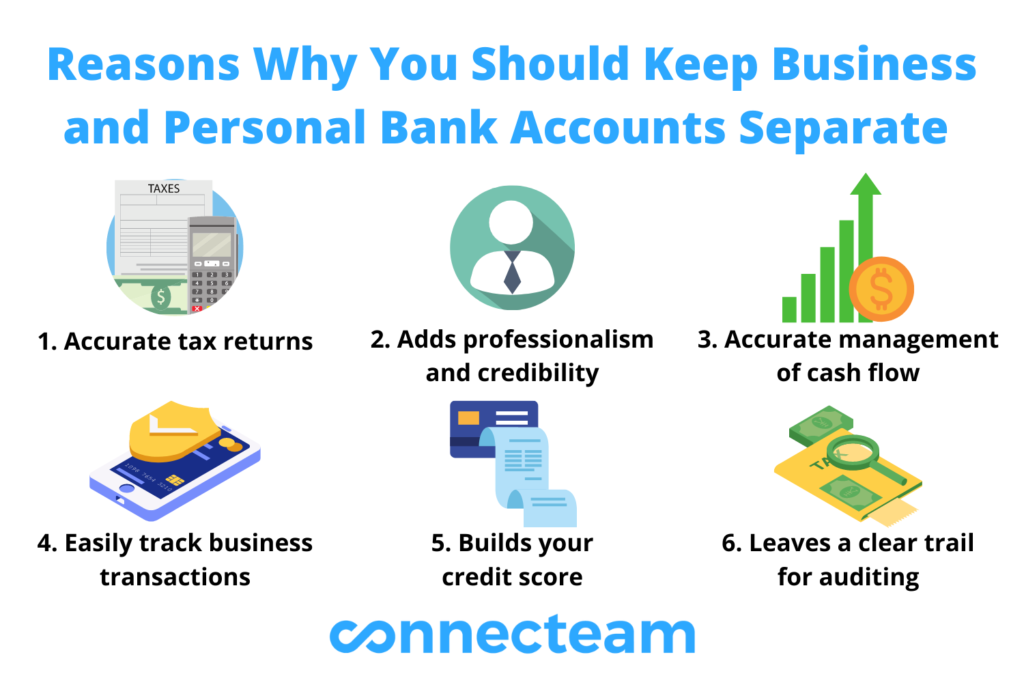When you start a side hustle, startup, or small business, it’s essential to separate your personal finances from your business finances. One of the first steps in achieving this separation is opening a business bank account. Business bank accounts are similar to personal bank accounts, but they offer specific features and benefits tailored to the needs of businesses.
In this comprehensive guide, we will explore the different types of business bank accounts available, including business checking accounts, business savings accounts, business money market accounts, business certificate of deposit accounts, merchant accounts, and trust accounts. We’ll discuss the pros and cons of each account type, helping you make an informed decision about which accounts are suitable for your business.
Business Checking Account

A business checking account is an essential financial tool for any business. Similar to a personal checking account, it allows you to deposit and withdraw funds, write checks, and use a debit card for business transactions. However, business checking accounts often come with higher monthly fees, balance requirements, and transaction limitations compared to personal checking accounts.
Key Features of a Business Checking Account
-
Higher Monthly Fees and Balance Requirements: Unlike personal checking accounts, business checking accounts may have higher monthly fees and minimum balance requirements. It’s important to consider these costs when choosing a business checking account.
-
Transaction Limits: Many business checking accounts come with transaction limits, meaning there is a maximum number of free monthly transactions. Additional transactions may incur fees. It’s essential to understand these limits and fees before opening a business checking account.
-
Overdraft Protection: Some banks offer overdraft protection for business checking accounts. This feature can help prevent declined transactions due to insufficient funds, but it often comes with additional fees.
Pros of a Business Checking Account
-
Financial Separation: Maintaining a separate business checking account helps you stay organized and simplifies tax time. It allows you to keep track of your business’s earnings and expenses separately from your personal finances.
-
Legal Separation: If your business is incorporated, separating your personal and business finances is crucial to maintain limited liability protection. Keeping your personal and business assets separate helps protect your personal assets from business-related liabilities.
-
Build Relationships and Credibility: Using a business checking account under your business’s official name builds credibility with stakeholders. It demonstrates your commitment to your business and helps establish a separate business credit score, which can be beneficial when seeking financing or partnerships.
-
Access to Lines of Credit: Some business checking accounts offer lines of credit to help businesses manage cash shortages or unexpected expenses. These lines of credit provide a flexible source of funding, often with competitive interest rates.
-
Business Credit Cards: Many banks offer business credit cards to their account holders. Having a business credit card can help you manage business expenses, build a credit history for your business, and earn rewards on qualifying purchases.
Cons of a Business Checking Account
-
Timing and Cost: If your business is in its early stages and not generating significant revenue, opening a business checking account may not be necessary yet. Opening a business bank account takes time, and the fees associated with business checking accounts can be higher than those of personal accounts.
-
Expense: Business checking accounts often come with monthly fees and transaction fees. If you can maintain accurate records of your business’s finances using a personal account, it may be more cost-effective to postpone opening a business checking account until your business grows.
Business Savings Account
In addition to a business checking account, many businesses choose to open a business savings account. A business savings account allows businesses to earn interest on excess capital while providing a secure place to store funds.
Key Features of a Business Savings Account
-
Higher Minimum Balance Requirements: Business savings accounts often require a higher minimum balance compared to personal savings accounts. It’s important to consider these requirements when selecting a business savings account.
-
Tax Simplification: Keeping excess cash in a business savings account can help simplify tax time by separating business funds from personal funds. It provides a clear record of business income and makes it easier to track deductible expenses.
-
Peace of Mind: A business savings account can serve as a financial cushion for your business, providing a reserve for unexpected expenses or downturns in revenue. Most business savings accounts are insured by the Federal Deposit Insurance Corporation (FDIC), offering protection for your deposits in case of bank failure.
Pros of a Business Savings Account
-
Higher Interest Rates: Business savings accounts generally offer higher interest rates compared to checking accounts. If your business has excess capital and wants to earn a higher return, opening a business savings account can be a wise financial decision.
-
Quarterly Payments: A business savings account can be an ideal place to set aside cash for quarterly estimated tax payments to the IRS. By keeping these funds separate from your other business funds, you can ensure they are readily available when needed.
-
Financial Cushion: Building a financial cushion through a business savings account can provide peace of mind for business owners. It helps prepare for unexpected events or emergencies and reduces the stress associated with managing a business.
Cons of a Business Savings Account
-
Restrictions on Withdrawals: Business savings accounts often come with stricter withdrawal restrictions compared to checking accounts. These restrictions may include limits on the number of withdrawals per month or penalties for early withdrawals. It’s essential to understand these restrictions before opening a business savings account.
-
Minimum Balance Requirements: Business savings accounts typically have higher minimum balance requirements compared to personal savings accounts. Failing to maintain the minimum balance may result in fees or the downgrade of the account to a lower interest rate.
Business Money Market Account

A business money market account is another option for businesses to earn interest on excess capital while maintaining some flexibility. Money market accounts offer higher interest rates than regular savings accounts and often include additional features like check-writing privileges.
Key Features of a Business Money Market Account
-
Higher Interest Rates: Business money market accounts provide higher interest rates than regular savings accounts, allowing businesses to earn a more significant return on their excess capital.
-
Flexibility: Money market accounts offer some degree of flexibility when it comes to accessing funds. Many accounts allow limited check-writing privileges, making it easier to make payments directly from the account.
Pros of a Business Money Market Account
-
Higher Interest Rates: If you have excess capital and want to maximize your return, a business money market account can provide a higher interest rate compared to regular savings accounts.
-
Flexibility: Money market accounts offer more flexibility compared to certificates of deposit. With check-writing privileges and the ability to make limited withdrawals, you can access your funds when needed.
Cons of a Business Money Market Account
-
Restrictions on Withdrawals: While business money market accounts offer more flexibility than certificates of deposit, they still come with restrictions on withdrawals. There may be limitations on the number of withdrawals per month, and exceeding these limits can result in fees or a downgrade to a lower interest rate.
-
Less Flexibility than Regular Savings Accounts: While business money market accounts provide some flexibility, they are still less flexible than regular business savings accounts. It’s important to evaluate your business’s cash flow needs before choosing a money market account.
Business Certificate of Deposit Account
A business certificate of deposit (CD) account is a savings option that offers an even higher interest rate than money market accounts. CDs require you to deposit a specific amount of money for a fixed period, and in return, you earn a guaranteed interest rate.
Key Features of a Business Certificate of Deposit Account
-
Higher Interest Rates: Certificate of deposit accounts generally offer the highest interest rates among business savings options. By locking your funds into a CD for a set period, you can earn a more significant return.
-
Fixed Term: CDs have a fixed term, ranging from a few months to several years. During this period, you cannot withdraw the funds without incurring penalties.
Pros of a Business Certificate of Deposit Account
-
Higher Interest Rates: If you have excess capital that you know you won’t need for a while, a certificate of deposit account can provide a higher interest rate compared to other savings options.
-
Guaranteed Returns: With a CD, you know exactly how much interest you will earn over the fixed term. This guarantees a return on your investment, making it a suitable choice for businesses looking for a secure savings option.
Cons of a Business Certificate of Deposit Account
-
Penalties for Early Withdrawal: Unlike other savings options, early withdrawal from a certificate of deposit account often results in penalties. These penalties can eat into your interest earnings and reduce the overall return on your investment.
-
Lack of Flexibility: Once you deposit funds into a CD account, you cannot access them until the fixed term ends. If your business needs immediate access to funds, a certificate of deposit may not be the best option.
Merchant Account
A merchant account is a specialized type of business bank account that allows businesses to accept payments from various sources, including debit and credit cards. Merchant accounts act as a bridge between payment methods and your business banking account.
Key Features of a Merchant Account
-
Flexibility: Merchant accounts enable businesses to accept a wide range of payment methods, including traditional card payments and online transactions. This flexibility allows businesses to cater to customer preferences and expand revenue opportunities.
-
Purchase Protection: Banks that provide merchant accounts often offer purchase protection to ensure the security of your customers’ payment information.
Pros of a Merchant Account
-
Flexible Payment Options: With a merchant account, you can offer your customers multiple payment options, such as card payments and online transactions. This flexibility can attract more customers and increase your revenue potential.
-
Purchase Protection: Merchant accounts come with built-in security measures to protect your customers’ payment information, reducing the risk of fraud or data breaches.
Cons of a Merchant Account
-
Transaction Fees: Under a merchant account agreement, most card and electronic transactions incur fees. These fees can vary depending on your provider and their fee structure, potentially impacting your business’s profitability.
-
Additional Complexity: Managing a merchant account adds an extra layer of complexity to your financial operations. It requires integration with payment processing systems, compliance with security standards, and ongoing monitoring of transactions.
Trust Account

Certain professionals, such as lawyers, are required to hold unearned income, such as retainers, in a trust account. Trust accounts are managed by a third party and have specific rules and regulations governing their use.
Key Features of a Trust Account
-
Legal Requirement: Trust accounts are necessary for professionals who handle unearned income on behalf of clients. They ensure that client funds are kept separate from the professional’s personal and business accounts.
-
Strict Regulations: Trust accounts come with specific rules and regulations that professionals must follow to maintain compliance. Failure to adhere to these rules can result in severe penalties.
Pros of a Trust Account
-
Compliance with Legal Requirements: By maintaining a trust account, professionals can fulfill their legal obligations and ensure the proper handling of client funds.
-
Protection of Client Funds: Trust accounts provide an additional layer of protection for client funds, reducing the risk of misappropriation or misuse.
Cons of a Trust Account
-
Increased Complexity: Trust accounts come with strict regulations and reporting requirements, adding complexity to financial management and record-keeping.
-
Limited Use: Trust accounts are only necessary for professionals who handle unearned income. If your business does not require this type of account, it may not be relevant to your financial operations.
Conclusion
When it comes to managing your business’s finances, choosing the right bank accounts is crucial. Whether you opt for a business checking account, business savings account, business money market account, business certificate of deposit account, merchant account, or trust account, each type offers unique features and benefits to meet your business’s specific needs.
By understanding the different types of business bank accounts and their pros and cons, you can make an informed decision that aligns with your business goals and financial requirements. Remember to consider factors such as fees, interest rates, minimum balance requirements, and withdrawal restrictions when selecting the most suitable accounts for your business.
Take the time to research and compare offerings from different banks and financial institutions to find the best fit for your business. Opening the right business bank accounts will not only streamline your financial operations but also set a solid foundation for your business’s growth and success.
